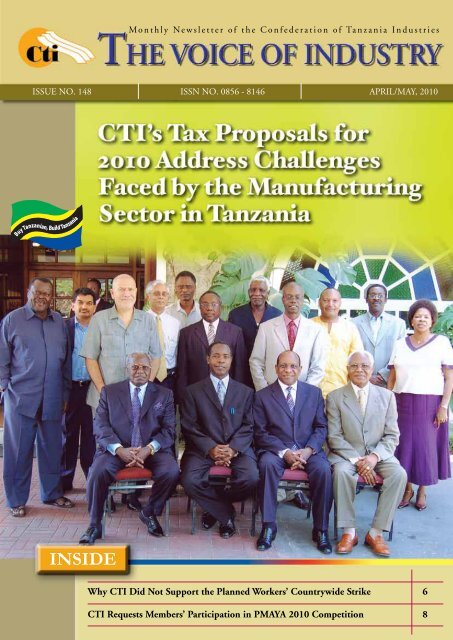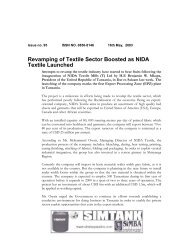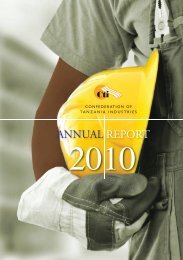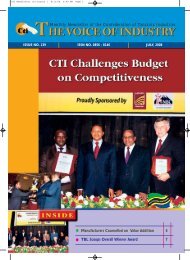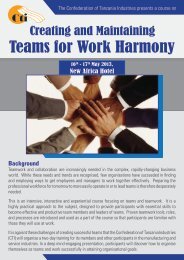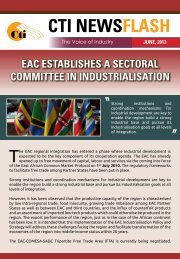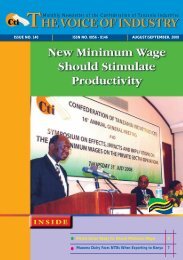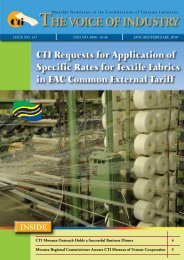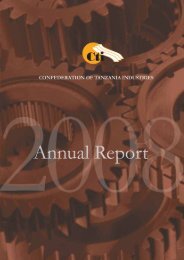CTI_Newsletter_Issue_148 - Confederation of Tanzania Industries
CTI_Newsletter_Issue_148 - Confederation of Tanzania Industries
CTI_Newsletter_Issue_148 - Confederation of Tanzania Industries
Create successful ePaper yourself
Turn your PDF publications into a flip-book with our unique Google optimized e-Paper software.
Monthly <strong>Newsletter</strong> <strong>of</strong> the <strong>Confederation</strong> <strong>of</strong> <strong>Tanzania</strong> <strong>Industries</strong>M o n t h l y Ne w s l e t t e r o f t h e C o n f e d e r a t i o n o f Ta n z a n i a I n d u s t r i e sISSUE NO. <strong>148</strong> ISSN NO. 0856 - 8146 APRIL/MAY, 2010INSIDEWhy <strong>CTI</strong> Did Not Support the Planned Workers’ Countrywide Strike 6<strong>CTI</strong> Requests Members’ Participation in PMAYA 2010 CompetitionThe Voice <strong>of</strong> Industry1www.cti.co.tz8
Monthly <strong>Newsletter</strong> <strong>of</strong> the <strong>Confederation</strong> <strong>of</strong> <strong>Tanzania</strong> <strong>Industries</strong>CONTENTS<strong>CTI</strong>’s Tax Proposals for 2010 AddressChallenges Faced by the ManufacturingSector in <strong>Tanzania</strong> 4Why <strong>CTI</strong> Did Not Support thePlanned Workers’Countrywide Strike 5<strong>CTI</strong> Requests Members’ Participationin PMAYA 2010 Competition 8Trade Fairs & Exhibitions 10EDITORIAL MEMBERSCHAIRMAN OF EDITORIAL BOARDDr. Samuel NyantaheEDITORMrs. Christine KilinduMEMBERMr. Thomas KimbungaThe Voice <strong>of</strong> Industry is Published by:The <strong>Confederation</strong> <strong>of</strong> <strong>Tanzania</strong> <strong>Industries</strong> (<strong>CTI</strong>)9th Floor, NIC Investment House,P.O. Box 71783 Dar es Salaam, <strong>Tanzania</strong>Tel: +255 22 2114954, 2123802, 2130327Fax: +255 22 2112414E-mail: cti@cti.co.tzWebsite: www.cti.co.tzThe Voice <strong>of</strong> Industry3www.cti.co.tz
Monthly <strong>Newsletter</strong> <strong>of</strong> the <strong>Confederation</strong> <strong>of</strong> <strong>Tanzania</strong> <strong>Industries</strong><strong>CTI</strong>’s Tax Proposals for 2010 AddressChallenges Faced by the ManufacturingSector in <strong>Tanzania</strong>In a bid to improve thecompetitiveness <strong>of</strong> <strong>Tanzania</strong>manufacturers in both domesticand international markets, the<strong>Confederation</strong> <strong>of</strong> <strong>Tanzania</strong> <strong>Industries</strong>(<strong>CTI</strong>) has submitted to the TaskForce on Tax Reforms, tax proposalswhich aim at addressing thechallenges faced by manufacturersduring the past year.The <strong>Confederation</strong> noted that theperformance <strong>of</strong> the sector last yearwas slightly unsatisfactory. It has beenin 2009. The country’s export earningsdeclined from 26% <strong>of</strong> the total exportearnings in 2008 to 19.0% in 2009and formal employment declined from92,015 to 88,415 during the period.<strong>CTI</strong> points out that the performance<strong>of</strong> the manufacturing sector wasconstrained by many challenges like thefinancial and economic crisis; increasedimportation <strong>of</strong> subsidized productssuch as cement and textiles mainlyfrom the Far East Asian countries;power rationing; poor infrastructures,administration by the central and localgovernments plus poor performance<strong>of</strong> <strong>Tanzania</strong> in the World Bank DoingBusiness Report under ‘paying taxes’criteria.As a result, the <strong>Confederation</strong> <strong>of</strong><strong>Tanzania</strong> <strong>Industries</strong>’ submissionaims at accelerating growth <strong>of</strong> themanufacturing sector by 10%;enhancing export earnings above 25%;increasing employment from about88,415 in 2009 to 95,000 during 2010.Likewise, it aims at simplifying taxadministration proceduresas paying taxes was one <strong>of</strong>the areas which adverselyaffected <strong>Tanzania</strong>s’ positionin the World Bank Report onDoing Business. It also aimsat increasing governmentrevenue to financeinfrastructure developmentprojects.The Chairman <strong>of</strong> <strong>CTI</strong> Mr. Felix G N Mosha in consultation with Past Chairmen Mr.Reginald A Mengi (right) and Mr. Arnold B S Kilewo (centre)established that the sector’s growth ratedeclined from 9.9% in 2008 to 9.5%including congestion at Dar es Salaamport, dilapidated central railway andin 2009 and its contribution to GDP roads. Other challenges includeddeclined from 9.4% in 2008 to 9.2% cumbersome procedures for taxFollowing the same patternused in the past, <strong>CTI</strong>’sPre-Budget Proposals weredivided into two maincategories: Cross-Cutting<strong>Issue</strong>s and Company/Sector-Specific <strong>Issue</strong>s. Cross-Cutting proposals revolvearound those issues whichaffect the entire economy,while company- specificproposals encompass proposals thataffect specific companies or a givensub-sector <strong>of</strong> the economy. This year,the <strong>Confederation</strong> submitted five CrossThe Voice <strong>of</strong> Industry4www.cti.co.tz
Monthly <strong>Newsletter</strong> <strong>of</strong> the <strong>Confederation</strong> <strong>of</strong> <strong>Tanzania</strong> <strong>Industries</strong>Cutting <strong>Issue</strong>s to the Government.First was the reduction <strong>of</strong> ExciseDuty on HFO from TZS 109 to TZS0 per litre in phases over three (3)years. This was intended to enhancecompetitiveness <strong>of</strong> industries, as HFOis an input in heavy industries and nota final product. Abolishing the duty asproposed would generate more revenueto the government due to increasedproduction. Its abolition would meanthat <strong>Tanzania</strong>n products would beable to compete more effectively withsimilar products from other EastAfrican countries as no country in theregion charged Excise Duty on HFO.The second cross-cutting proposal wasreduction <strong>of</strong> Skills and DevelopmentLevy (SDL) from 6 per cent to 4 percent in 2010/2011 and 2 percent in2011/2012. It has been proposed toextend payment <strong>of</strong> SDL to parastatals,government agencies and all institutions<strong>of</strong> commercial nature. <strong>CTI</strong> argues thathigh SDL discourages employment onpermanent bases and it is perceived bythe private sector as non transparentand a hidden tax. Confining it to theprivate sector is viewed as penalizingemployers in the private sector asparastatals and agencies doing businessare not charged. It also reduces thecompetitiveness <strong>of</strong> local industries.The third proposal which was submittedto the Task Force was the removal <strong>of</strong>VAT on rented private houses in orderto encourage construction <strong>of</strong> more goodhouses and to remove discriminationamong tenants occupying NHChouses and those dwelling in privaterented houses. The tax is viewed asdiscriminatory because the NationalHousing Corporation does not paythe tax and it increases the burdenon people renting private houses. Italso discourages construction <strong>of</strong> morehouses for lease and thus increaseshousing problems in urban areas.The fourth proposal was theimprovement <strong>of</strong> tax administration byclose monitoring <strong>of</strong> false classification,under declaration <strong>of</strong> quantities, underinvoicing<strong>of</strong> values <strong>of</strong> imports anddiversion <strong>of</strong> tax exempt products todomestic market.On sector-specific issues, <strong>CTI</strong>submitted various proposals that werereceived from its members for thegovernment’s consideration. The firstsector-specific proposal was abolition<strong>of</strong> 120% Excise Duty on plasticbags with more than 30 micronsand replacing it with a green levy <strong>of</strong>50%. This action would enhance taxcompliance, reduce cost <strong>of</strong> productionand discourage smuggling <strong>of</strong> thinmicron bags. Secondly, <strong>CTI</strong> requestedmaintenance <strong>of</strong> the current excise taxstructure on cigarettes (specific filter/non-filter) with 75% domestic tobaccocontent as it had generated a steady andpredictable tax revenue stream (Excisetax and VAT up 14% from TZS 80.4billion in 2007 to TZS 98.8 billion in2009). It is also easy to administer asit is based on a specific unit (TZS/000cigarettes).Another proposal was the phasing out<strong>of</strong> excise duty on s<strong>of</strong>t drinks over 5years. This is because s<strong>of</strong>t drinks areclassified as mass market consumptiongoods, tax induced market distortionand volume growth to compensateapparent revenue loss. Furthermore,<strong>CTI</strong> proposed reinstating <strong>of</strong> 10%import duty on pharmaceuticals inorder to increase government revenueand enhance competitiveness <strong>of</strong>local pharmaceutical industry. It alsorequested the reduction <strong>of</strong> importduty <strong>of</strong> 10% to 0% on pharmaceuticalpackaging materials to enhance thecompetitiveness <strong>of</strong> local pharmaceuticalindustry, create a level playing field andencourage more investments.In respect <strong>of</strong> the paper convertingindustry, the <strong>Confederation</strong> urgeda reduction <strong>of</strong> import duty on kraftliner for paper convertors from 25% to10%, the reason being that these werethe raw materials for paper convertorsand Mufindi Paper Mills did notproduce them in adequate quantitiesand its products were very expensive.Its reduction would increase thecompetitiveness <strong>of</strong> local industries.For the fishing and fish processingindustry, <strong>CTI</strong> requested thereplacement <strong>of</strong> all royalties with afisheries sustainable management fundwhich would be used for sustainablefishing in order to sustain the fishingindustry. For the cement industry, the<strong>Confederation</strong> strongly recommendedthe reinstatement <strong>of</strong> the suspendedduty on cement and raising importduty from 25% to 35% or US$ 50 permetric tonne whichever was higher.It assured the government that localcapacity had increased to 3 millionmetric tonnes against a demand <strong>of</strong>2 million metric tonnes. The movewould also prevent export <strong>of</strong> jobs.<strong>CTI</strong> also submitted a proposal to zerorate VAT on exercise books printedin <strong>Tanzania</strong> and on text books. Thiswould encourage value addition locallyand reduce consumer prices. It wouldalso encourage more investment in theThe Voice <strong>of</strong> Industry5www.cti.co.tz
Monthly <strong>Newsletter</strong> <strong>of</strong> the <strong>Confederation</strong> <strong>of</strong> <strong>Tanzania</strong> <strong>Industries</strong>manufacturing <strong>of</strong> books and create alevel playing field between players inthe region. It urged the governmentto harmonise the VAT rate withKenya and Uganda. Furthermore,the <strong>Confederation</strong> requested theexemption <strong>of</strong> VAT on milk packagingmaterials under special relief thirdschedule <strong>of</strong> VAT Act and reduction<strong>of</strong> VAT on bread from 18% to 0%.It strongly urged the governmentto reinstate VAT special relief onpackaging for pharmaceuticalindustry and exempt VAT on“mashudu” for edible oil industry tomitigate against imports from outsidethe country. <strong>CTI</strong> also proposed zerorating or exempting VAT on fruitjuices and increasing the export levyon raw cashew nuts from 10% to15% <strong>of</strong> FOB value or US$150/MT,whichever was higher.In its concluding remarks, the<strong>Confederation</strong> urged the governmentto make policy decisions that wouldlead to the reduction <strong>of</strong> the cost <strong>of</strong>doing business in the country tomake the market more attractiveto investors. The <strong>Confederation</strong>expressed the hope that the Task Forcewould consider positively its proposalsas they aimed at collecting moregovernment revenue and enhancingeconomic growth. <strong>CTI</strong> believed thatthe Public Private Partnership shouldbe based on mutual trust and expectedissues to be acted on with the aim <strong>of</strong>taking the economy from low to highlevels <strong>of</strong> economic development. Itwas <strong>of</strong> the view that to achieve the<strong>Tanzania</strong> 2025 Development Visionand Millennium DevelopmentGoals was possible and called for thegovernment to have the right policiesand priorities.Why <strong>CTI</strong> Did Not Supportthe Planned Workers’Countrywide StrikeThe Trade Union Congress <strong>of</strong><strong>Tanzania</strong> (TUCTA) had threatened tostage a country-wide workers’ strikewhich was to start on 5th May 2010on claims that workers’ interests anddemands were ignored by employers,including the government. Workers’demands include low wages andsalaries, high taxes, poor pensionsand fringe benefits. In responseto TUCTA’s call, the Chairman <strong>of</strong>the <strong>Confederation</strong>, Mr. Felix G NMosha issued a Press Statementthat conveyed a clear message to theemployees and the public in generalon the side effects <strong>of</strong> the proposedworkers’ strike if it was implemented.In his statement, Mr. Mosha pointedout that there could not be a winnerin that kind <strong>of</strong> situation; it was thecountry as a whole which would lose.The implication <strong>of</strong> a workers’ strikewould have been dire to the economy.Apart from huge losses in productionin all sectors, which <strong>Tanzania</strong> couldnot afford, the Chairman said that theprevailing threat <strong>of</strong> a strike was alreadycreating uncertainty for domestic andforeign investors not just because <strong>of</strong>the negative effects the strike wasgoing to have on the economy, butalso, the concerns that <strong>Tanzania</strong>nswere not succeeding in evolving aculture <strong>of</strong> resolving differences throughnegotiations, which was critical tonational stability.He called on workers to be mindful <strong>of</strong>the current weak economy the countrywas passing through. He said that<strong>CTI</strong> was <strong>of</strong> the view that workers andTUCTA in particular, were aware thatvarious macro-economic conditionswere showing that the performance<strong>of</strong> <strong>Tanzania</strong>’s economy had not fullyrecovered from the global economiccrisis. For example, the GDP growthrate had declined from 7.7 per cent in2008 to around 5.5 per cent in 2009and in the case <strong>of</strong> manufacturing, thesector’s growth rate had declined from9.9 per cent in 2008 to 9.5 per centin 2009. Mr Mosha noted that thedemands that TUCTA was makingwere not without some merits, whichwas why negotiations were absolutelynecessary.The Chairman doubted the extent theplanned countrywide workers’ strikehad taken into consideration thosesocio-economic realities prevailing inthe country. Such realities includedthe recent increase <strong>of</strong> minimum wages<strong>of</strong> TZS 120,000/- and 150,000/- permonth for civil servants and workersin the private sector, respectively andlower levels for farm workers and othercategories. He said these increases werenot achieved through any strike byworkers.Mr. Mosha expressed the view thatthe <strong>Confederation</strong> was not persuadedthat the countrywide workers’ strikeplanned by TUCTA was a solution toworkers’ problems. To the contrary,the strike would have fuelled moreproblems to workers, employers andThe Voice <strong>of</strong> Industry6www.cti.co.tz
Monthly <strong>Newsletter</strong> <strong>of</strong> the <strong>Confederation</strong> <strong>of</strong> <strong>Tanzania</strong> <strong>Industries</strong>The Chairman <strong>of</strong> <strong>CTI</strong>, Mr. Felix G N Mosha addressing the press.the economy at large and jeopardisedthe government’s efforts to eradicatepoverty in <strong>Tanzania</strong>. He added that<strong>CTI</strong> was <strong>of</strong> the opinion that there wereother acceptable ways <strong>of</strong> achievingworkers’ demands without staginga strike. After all, the planned strikewould have mostly hit innocent peoplewithin the population.The <strong>Confederation</strong> requested allworkers, through TUCTA, to callthe planned strike <strong>of</strong>f and resumeroundtable negotiations for amicableand sustainable solutions. <strong>CTI</strong> was <strong>of</strong>the view that workers should call <strong>of</strong>f theplanned strike as it was not beneficial toanybody at this time when the economywas at the early state <strong>of</strong> recovery fromthe 2009 economic recession. Equally,employers, including the government,were requested to sit together withworkers through TUCTA to negotiateand reach a consensus on salaries,wages, pension and fringe benefitsaffordable and agreeable to both partiesand agree on measures to improveproductivity necessary to sustain suchwage levels and benefits.The Chairman’s statement ended bypointing out that the <strong>Confederation</strong>did not believe that the intention <strong>of</strong>TUCTA was to destroy the economyor inflict undue hardship on ordinary<strong>Tanzania</strong>ns who on daily basis rely onservices which a workers’ strike woulddeny them. Given that those werenot the intentions <strong>of</strong> TUCTA, such aposition made negotiations necessary,he said.He observed that each countryhad certain characteristics whichdistinguished it from others. <strong>Tanzania</strong>distinguished itself through its citizenswho had always solved their problemsthrough dialogue and negotiationsbecause they were politically andsocially mature. <strong>Tanzania</strong>ns believedthat strikes and other mass protestswhich might lead to violent actionscould not achieve permanent solutionsto problems.<strong>Tanzania</strong>ns had tolerated each other inthe past in building peace and harmonywhich citizens <strong>of</strong> this country wereproud <strong>of</strong>. He added that it was going tobe a departure from the citizens’ cultureand sense <strong>of</strong> stability if a democraticinstitution like TUCTA was going tostage a countrywide workers’ strike todemand rights which could be achievedin serious negotiations. Mr. Moshaended his statement by pointing outthat it was not too late to go back tothe negotiation table.The Voice <strong>of</strong> Industry7www.cti.co.tz
Monthly <strong>Newsletter</strong> <strong>of</strong> the <strong>Confederation</strong> <strong>of</strong> <strong>Tanzania</strong> <strong>Industries</strong>The Voice <strong>of</strong> Industry11www.cti.co.tz
Monthly <strong>Newsletter</strong> <strong>of</strong> the <strong>Confederation</strong> <strong>of</strong> <strong>Tanzania</strong> <strong>Industries</strong>The Voice <strong>of</strong> Industry12www.cti.co.tz


